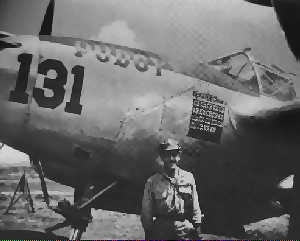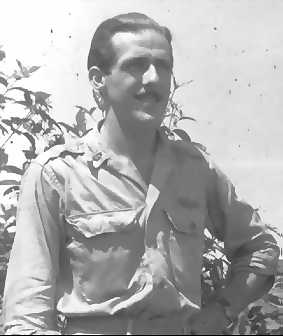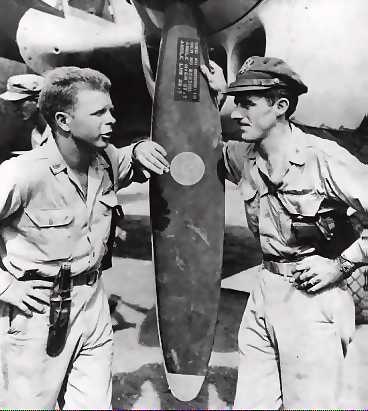Congressional Medal of Honor

*McGUlRE, THOMAS B, JR. - (Air Mission)
Major, US Army Air Corps, 13th Air Force. Action: Over Luzon, Philippine Islands, 2526 Dec
1944. Inducted: Sebring, Fla.. Born: Ridgewood, N.J. G.O.#24, 7 March 1946.
Citation: He fought with conspicuous
gallantry and intrepidity over Luzon, Philippine Islands. Voluntarily, he led a squadron
of 15 P-38's as top cover for heavy bombers striking Mabalacat Airdrome, where his
formation was attacked by 20 aggressive Japanese fighters. In the ensuing action he
repeatedly flew to the aid of embattled comrades, driving off enemy assaults while himself
under attack and at times outnumbered 3 to 1, and even after his guns jammed, continuing
the fight by forcing a hostile plane into his wingman's line of fire. Before he started
back to his base he had shot down 3 Zeros. The next day he again volunteered to lead
escort fighters on a mission to strongly defended Clark Field. During the resultant
engagement he again exposed himself to attacks so that he might rescue a crippled bomber.
In rapid succession he shot down 1 aircraft, parried the attack of 4 enemy fighters, 1 of
which he shot down, single-handedly engaged 3 more Japanese, destroying 1, and then shot
down still another, his 38th victory in aerial combat. On 7 Jan 1945, while leading a
voluntary fighter sweep over Los Negros Island, he risked an extremely hazardous maneuver
at low altitude in an attempt to save a fellow flyer from attack, crashed, and was
reported missing in action. With gallant initiative, deep and unselfish concern for the
safety of others, and heroic determination to destroy the enemy at all costs, Maj. McGuire
set an inspiring example in keeping with the highest traditions of the military service. |
 Maj.
Thomas B. McGuire Jr., whose memory was preserved by the naming of McGuire Air Force Base,
was born in Ridgewood, N.J., Aug. 1, 1920. He left college in his third year to join the
U.S. Army Air Corps in 1941 as an aviation cadet.
Maj.
Thomas B. McGuire Jr., whose memory was preserved by the naming of McGuire Air Force Base,
was born in Ridgewood, N.J., Aug. 1, 1920. He left college in his third year to join the
U.S. Army Air Corps in 1941 as an aviation cadet. On Jan. 7, 1945, McGuire was leading a group of four P-38s
over a Japanese-held airstrip on the Los Negros Islands, the Philippines. His formation
scattered and an enemy aircraft zeroed in on one of the P-38s. The pilot radioed for help
and McGuire was quick to respond. Flying in a tight situation at low altitude caused
McGuire's plane to stall and crash. He died in his attempt to save a friend's life.
On Jan. 7, 1945, McGuire was leading a group of four P-38s
over a Japanese-held airstrip on the Los Negros Islands, the Philippines. His formation
scattered and an enemy aircraft zeroed in on one of the P-38s. The pilot radioed for help
and McGuire was quick to respond. Flying in a tight situation at low altitude caused
McGuire's plane to stall and crash. He died in his attempt to save a friend's life.
